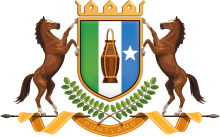| Dastuurka Dawladda Puntland | |
|---|---|
 | |
| Overview | |
| Jurisdiction | Puntland |
| Created | 15 May 1998 |
| Presented | 6 May 2010 |
| Ratified | 18 April 2012 |
| Date effective | 4 March 2012 |
| System | • presidential • parliamentary |
| Head of state | Government of Puntland |
| Judiciary | Supreme Court of Puntland |
| Citation | puntlandparliament |
| Author(s) | Abdirahman Farole |
| Signatories | 472 delegates |
 |
|---|
The Constitution of Puntland is the governing document and legal framework for the autonomous Puntland region of Somalia. It is the supreme law documenting the duties, powers, structure and function of the government of Puntland, subject only to Somalia's federal constitution. The current constitution, adopted on the 18 April 2012, is Puntland state's first and only permanent constitution.
Contents
- Constitutions
- 1998 Provisional Charter
- 2001 Constitution
- Provisions of the current Puntland constitution
- Title I: "The Puntland State And Its Founding Principles"
- Title II: "The Fundamental Rights And Guarantees Of The Person"
- Title III: "Economy"
- Title IV: "The Structure Of The Government"
- Title V: "The Administrative Government Of Puntland"
- Title VI: "Supremacy And Reform Of The Constitution"
- External links
- References